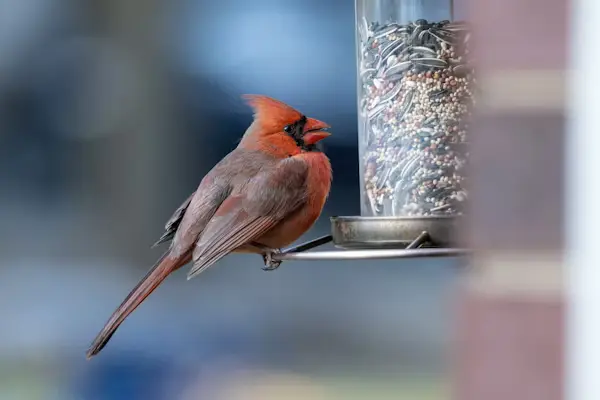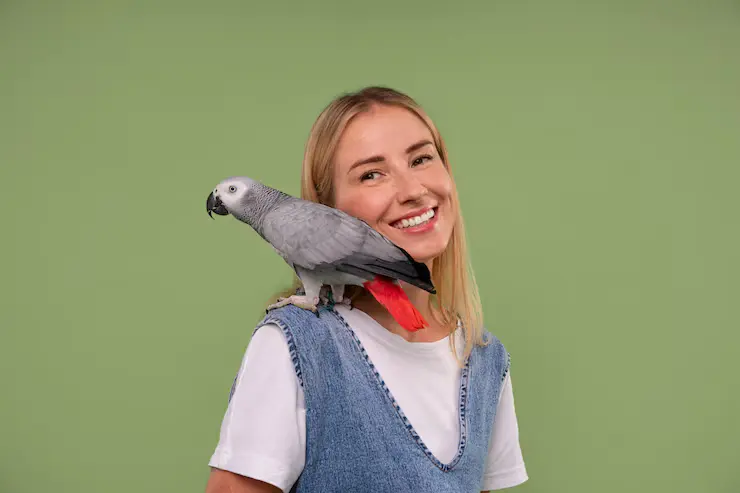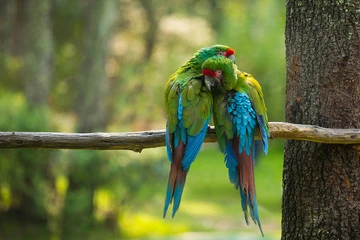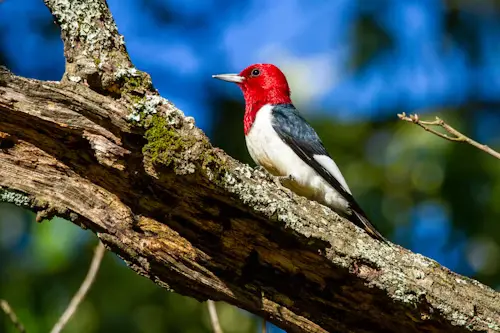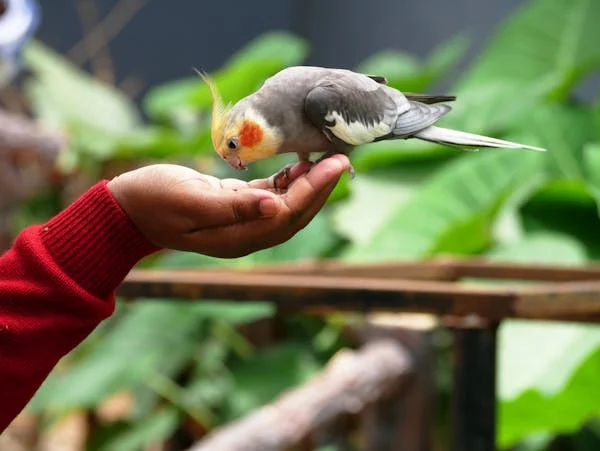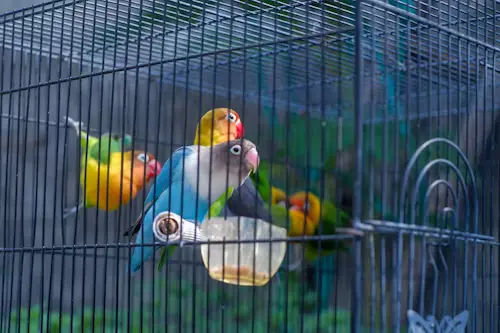The Ultimate Guide to Quaker Parrot Food: Everything You Need to Know About Proper Nutrition
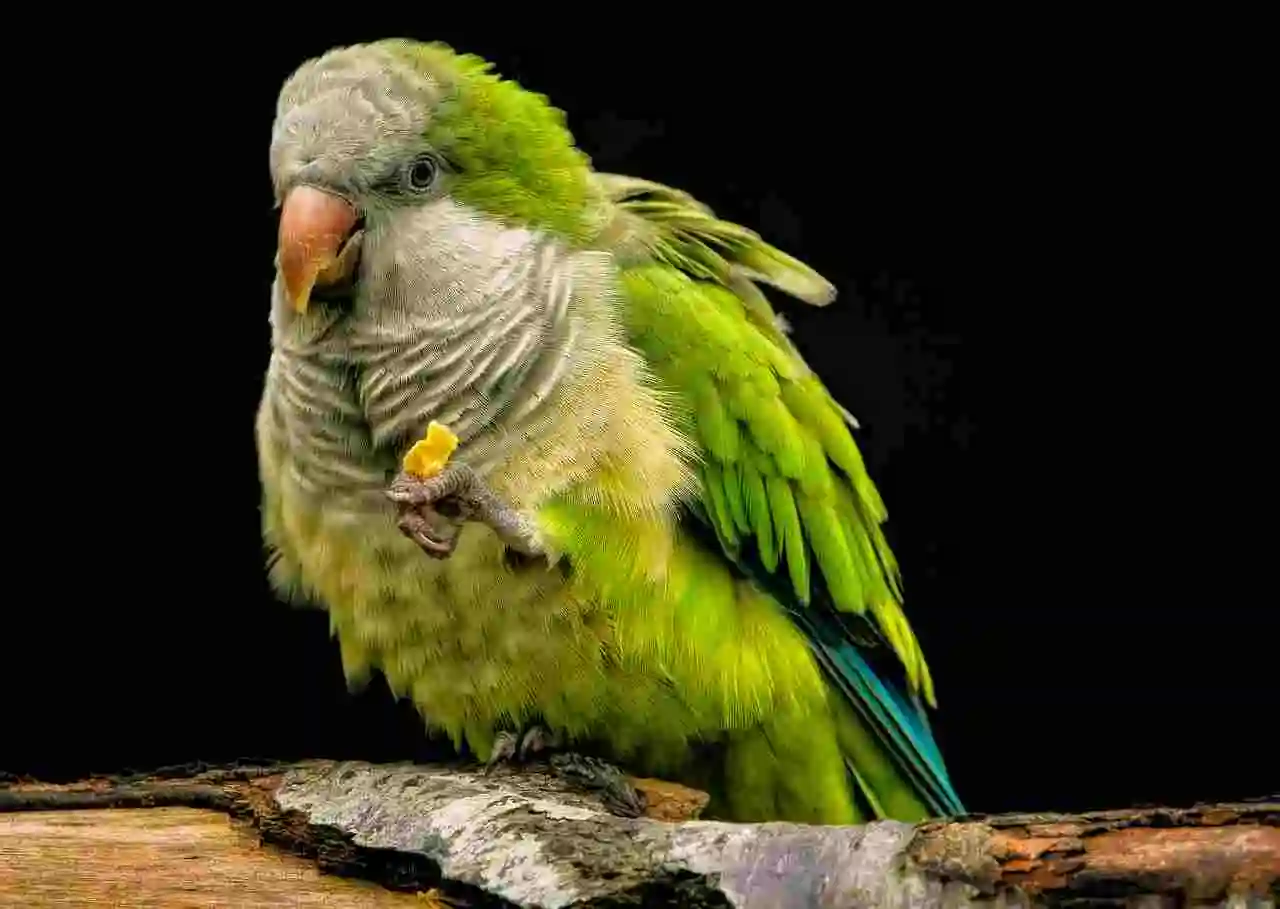
Did you know that a well-fed Quaker parrot can live up to 20-30 years in captivity? These charismatic and intelligent birds, also known as Monk parakeets, require a specific diet to thrive and maintain their vibrant personalities. What you feed your feathered friend directly impacts their health, behavior, and longevity—making proper Quaker parrot food choices one of the most important aspects of responsible ownership.
In this comprehensive guide, we’ll explore everything you need to know about Quaker parrot diet requirements, from the foundation of their nutrition to specific foods to embrace or avoid. Whether you’re a new Quaker parent or looking to improve your longtime companion’s diet, this article will provide actionable information to ensure your bird receives optimal nutrition.
Table of Contents
Understanding Quaker Parrot Nutritional Needs
Quaker parrots require a balanced diet containing specific nutrients to maintain good health. Like humans, these birds need a mix of macronutrients (proteins, carbohydrates, and fats) and micronutrients (vitamins and minerals) to support their biological functions.
According to avian nutrition research from the University of California Davis Avian Sciences department, Quaker parrots require:
- Protein: 12-14% of diet for maintenance; higher (up to 18%) during molting periods
- Fat: 4-6% of diet
- Carbohydrates: For energy and fiber
- Vitamins: Particularly A, D3, E, and B complex
- Minerals: Including calcium, phosphorus, and trace minerals like zinc and iron
These nutritional needs can vary based on several factors:
- Age: Young, growing Quakers need more protein and calcium than adults
- Breeding status: Breeding females require additional calcium and protein
- Activity level: More active birds may need slightly more calories
- Health conditions: Birds with certain illnesses may have specialized dietary requirements
Dr. Susan Orosz, a renowned avian veterinarian, emphasizes that “nutrition is the foundation of avian health and many diseases we see in clinical practice have nutritional origins.” This underscores why understanding proper Quaker parrot food choices is essential.
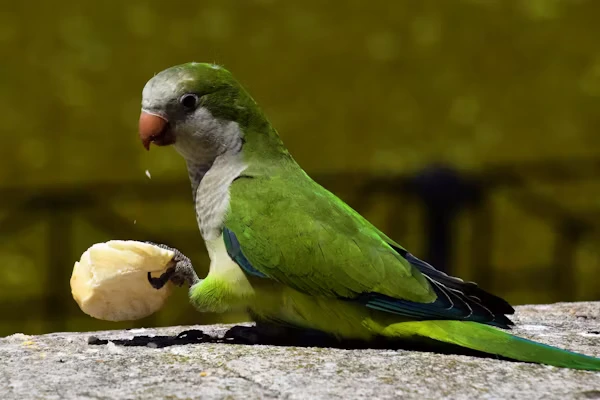
The Foundation of a Quaker Parrot Diet: Pellets
High-quality formulated pellets should constitute approximately 60-70% of your Quaker parrot’s diet. Unlike seeds, which are often nutritionally imbalanced, pelleted foods are specifically designed to meet birds’ nutritional requirements.
Types of Pellets
- Extruded pellets: Created using high-temperature, high-pressure processing that can help improve digestibility
- Cold-pressed pellets: Manufactured at lower temperatures to potentially preserve more nutrients
- Organic pellets: Made with certified organic ingredients for birds sensitive to pesticides or additives
Choosing Quality Pellets
When selecting Quaker parrot food in pellet form, look for:
- No artificial colors, flavors, or preservatives
- Whole food ingredients listed at the beginning of the ingredient list
- Appropriate vitamin and mineral content
- Appropriate pellet size for Quaker parrots (medium-sized pellets)
Recommended Pellet Brands
Based on avian nutritionist recommendations and customer reviews, some quality pellet options include:
- Harrison’s Bird Foods High Potency Fine
- Roudybush Daily Maintenance
- TOPS Parrot Food
- ZuPreem Natural
- Lafeber’s Premium Daily Diet for Parrots
Disclaimer: These brand recommendations are based on nutritional content and reviews, not affiliate relationships.
Transitioning to Pellets
If your Quaker is accustomed to seeds, transitioning to pellets requires patience:
- Mix a small amount of pellets with their regular food, gradually increasing the proportion
- Place pellets in a separate dish near their favorite perch
- Try moistening pellets with a small amount of fruit juice initially
- Be persistent but patient—transitions can take weeks or even months
- Monitor weight during transitions to ensure adequate food intake
Supplementing with Seeds (In Moderation)
While pellets form the foundation of proper Quaker parrot food, seeds still have a place in your bird’s diet—albeit a much smaller one than many owners realize. Seeds should constitute only about 10-15% of the overall diet.
The Problem with All-Seed Diets
Many Quaker owners make the mistake of feeding primarily seeds because birds eagerly eat them. However, an all-seed diet is problematic because:
- Seeds are high in fat but low in many essential vitamins and minerals
- They can lead to obesity and fatty liver disease
- Seed-only diets are linked to nutritional deficiencies, particularly vitamin A deficiency
- The limited variety doesn’t provide adequate nutrition
Healthy Seed Options
When offering seeds as part of a balanced Quaker parrot diet, choose:
- Canary seed (lower in fat)
- Millet (in small amounts)
- Flax seeds (good source of omega-3)
- Safflower seeds (in moderation)
- Sunflower seeds (very sparingly as treats due to high fat content)
A quality seed mix specifically formulated for small to medium-sized parrots can be offered a few times per week in controlled portions. Ideally, look for mixes without added colorings or preservatives.
Fresh Fruits and Vegetables: Essential Variety
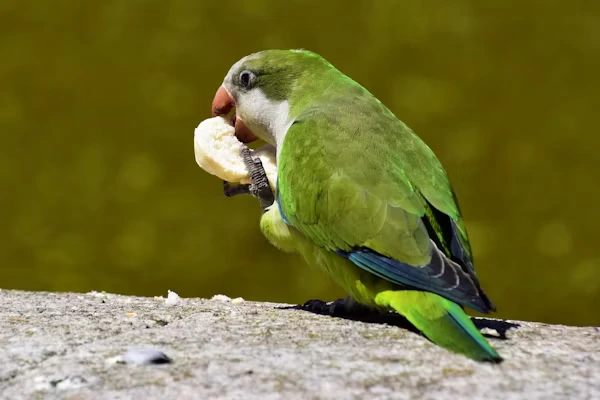
Fresh produce should make up about 20-30% of your Quaker parrot’s diet. These foods provide essential vitamins, minerals, and phytonutrients that support optimal health.
Safe Fruits for Quaker Parrots
| Fruit | Nutritional Benefits | Serving Tips |
|---|---|---|
| Apple (no seeds) | Vitamin C, fiber | Remove all seeds and core |
| Berries (strawberries, blueberries) | Antioxidants, vitamin C | Offer fresh or frozen (thawed) |
| Banana | Potassium, vitamin B6 | Slice into small pieces |
| Mango | Beta-carotene, vitamin C | Cut into small cubes |
| Papaya | Enzymes, vitamin A | Remove seeds before serving |
| Pear | Fiber, copper | Remove seeds and core |
| Melon | Hydration, vitamin A | Remove seeds and rind |
| Orange | Vitamin C | Offer in small amounts |
Healthy Vegetables for Quaker Parrots
| Vegetable | Nutritional Benefits | Serving Tips |
|---|---|---|
| Dark leafy greens (kale, spinach) | Calcium, vitamin A | Offer fresh, finely chopped |
| Bell peppers | Vitamin C, antioxidants | All colors are beneficial |
| Carrots | Beta-carotene, vitamin A | Can be offered raw or lightly steamed |
| Broccoli | Calcium, vitamin K | Offer florets in small pieces |
| Sweet potato | Beta-carotene, fiber | Must be cooked thoroughly |
| Squash | Vitamin A, antioxidants | Cook until soft |
| Peas | Protein, vitamins | Fresh or frozen (thawed) |
| Green beans | Fiber, vitamins | Fresh or steamed |
Preparing Fruits and Vegetables
To maximize the benefits of these Quaker parrot food options:
- Wash all produce thoroughly to remove pesticides and contaminants
- Serve vegetables raw or lightly steamed to preserve nutrients
- Cut into appropriately sized pieces to prevent choking
- Remove all seeds, pits, and stones from fruits
- Introduce new foods gradually to monitor tolerance
- Discard uneaten fresh food after 2-3 hours to prevent bacterial growth
Dr. Brian Speer, avian veterinarian and author, recommends “offering a variety of at least 8-10 different vegetables weekly to ensure diverse nutrient intake.”
Safe Treats and Healthy Snacks
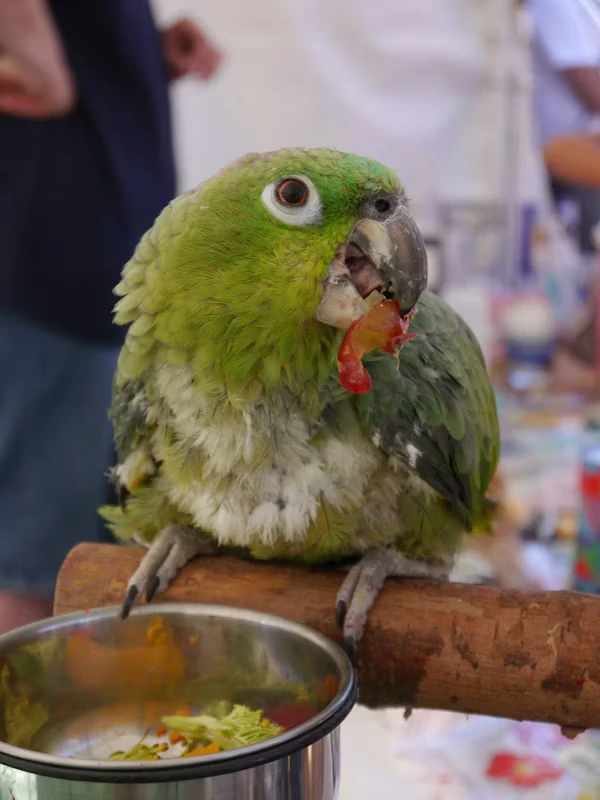
Treats should make up no more than 5-10% of your Quaker parrot’s overall diet but can provide enrichment and bonding opportunities.
Healthy Treat Options
- Nuts: Almonds, walnuts, and pecans (unsalted, unroasted) offer healthy fats but should be given sparingly due to high caloric content
- Whole grain products: Small pieces of whole grain toast or pasta (plain, cooked)
- Cooked legumes: Chickpeas, lentils (plain, no salt added)
- Sprouts: Nutrient-dense and enjoyed by many Quakers
- Small amounts of plain popcorn: Unsalted, unbuttered
- Coconut: Small pieces of fresh coconut meat occasionally
Remember that treats are just that—special occasions, not daily Quaker parrot food staples. Using healthy treats during training sessions can be particularly effective.
Foods to Avoid: Toxic and Dangerous
Some foods can be dangerous or even fatal to Quaker parrots. Never feed your bird:
- Avocado: Contains persin, which is toxic to birds and can cause sudden death
- Chocolate: Theobromine is highly toxic to birds
- Caffeine: Found in coffee, tea, and some sodas
- Alcohol: Even small amounts can be deadly
- Onions and garlic: Can cause digestive upset and anemia
- Mushrooms: Can contain toxins harmful to birds
- Salt and high-sodium foods: Can cause electrolyte imbalances and kidney problems
- Sugar and high-sugar foods: Can lead to obesity and bacterial overgrowth
- Fruit pits and apple seeds: Contain trace amounts of cyanide
- Rhubarb: Leaves contain oxalic acid which is toxic
- Uncooked beans: Contain hemagglutinin which is toxic unless thoroughly cooked
- Fried or fatty foods: Can cause digestive upset and fatty liver disease
Dr. Laurie Hess, avian veterinarian and author, warns that “birds can go from seemingly healthy to critically ill very quickly after consuming toxic foods, making prevention absolutely essential.”
Feeding Schedule and Portion Sizes
Establishing a consistent feeding schedule helps maintain healthy eating habits for your Quaker parrot.
Sample Daily Feeding Schedule
Morning:
- Fresh pellets (1-2 tablespoons for an average Quaker)
- Small amount of fresh vegetables (1 tablespoon chopped)
- Fresh water
Midday:
- Check and replenish pellets if needed
- Fresh water refresh
Evening:
- Small portion of fresh fruits or vegetables (1 tablespoon)
- Seeds or healthy treat (1 teaspoon a few times per week)
- Final water refresh
Determining Portion Sizes
The correct portion size depends on your individual bird’s size, activity level, and metabolism. As a general guideline:
- An adult Quaker parrot typically consumes about 10-15% of their body weight in food daily
- Monitor your bird’s weight regularly—significant changes may indicate portion adjustment needs
- Observe droppings—healthy droppings indicate proper digestion and appropriate intake
Always ensure fresh, clean water is available at all times, changing it at least twice daily.
Addressing Common Feeding Problems
Even with the best Quaker parrot food options available, you may encounter feeding challenges.
Picky Eating
Many Quakers become selective eaters, particularly if they were previously on a seed-heavy diet. Strategies to help include:
- Offer new foods in the morning when birds are hungriest
- Eat the same foods in front of your bird (they’re social eaters)
- Try different presentations—chopped, grated, or hung as foraging toys
- Be persistent—it may take 15-20 exposures before a bird accepts a new food
- Never remove all familiar foods, but gradually reduce dependence on less healthy options
Food Throwing
If your Quaker throws food out of their dish:
- Try different dish types—some birds prefer open plates, others deeper bowls
- Place newspaper or a tray beneath the cage for easier cleanup
- Provide foraging opportunities that encourage more engagement with food
- Understand that some food sorting is normal foraging behavior
When to Consult a Veterinarian
Seek veterinary guidance about your Quaker parrot diet if you notice:
- Significant weight loss or gain
- Changes in droppings (color, consistency, frequency)
- Decreased appetite lasting more than 24 hours
- Lethargy or behavior changes
- Difficulty eating or drinking
Homemade Quaker Parrot Food
While commercial pellets provide a nutritionally complete foundation, some owners choose to supplement with carefully prepared homemade options. Important: Always consult with an avian veterinarian before implementing homemade diets.
Nutritionally Balanced Bird “Chop”
A popular homemade supplement is “chop”—a mixture of finely chopped vegetables that can be prepared in batches and frozen in small portions.
Sample Chop Recipe:
- 1 bunch kale, finely chopped
- 1 red bell pepper, seeds removed and finely diced
- 1 carrot, grated
- 1/2 cup cooked quinoa (cooled)
- 1 small sweet potato, cooked and diced
- 1/4 cup sprouted lentils
- 1 tablespoon chopped fresh herbs (parsley, cilantro)
Mix ingredients thoroughly and portion into ice cube trays for freezing. Thaw a portion as needed.
Caution: Homemade foods should supplement, not replace, a quality pelleted diet unless under veterinary supervision.
Supplementation (When Necessary)
Most Quaker parrots receiving a proper diet of quality pellets, fresh produce, and limited seeds shouldn’t need additional supplementation. However, certain situations may warrant supplements:
- Calcium: May be needed for breeding females or birds showing signs of deficiency
- Vitamin A: For birds transitioning from seed-only diets showing signs of deficiency
- Probiotics: May benefit birds on antibiotics or with digestive issues
Always consult an avian veterinarian before adding any supplements to your Quaker parrot food regimen. Oversupplementation can be as harmful as deficiencies.
Debunking Common Myths About Quaker Parrot Food
Myth 1: “Seeds are a complete diet for parrots.”
Reality: While seeds are natural foods, domestic parrots eating only seeds often develop nutritional deficiencies. Wild Quakers consume a much more varied diet including vegetation, fruits, and insects.
Myth 2: “Pellets are unnatural and processed.”
Reality: While pellets are indeed processed, quality brands create nutritionally complete formulations specifically designed to meet parrots’ needs—something difficult to achieve with seeds alone.
Myth 3: “Avocado is a healthy fruit for all pets.”
Reality: Avocado contains persin, which is highly toxic to birds and can cause heart failure and sudden death in Quaker parrots.
Myth 4: “Birds will naturally eat what’s good for them.”
Reality: Domesticated birds often prefer high-fat, less nutritious options if available. Like children with candy, they’ll choose what tastes good rather than what’s nutritionally beneficial.
Myth 5: “Vitamin supplements can compensate for a poor diet.”
Reality: No supplement can replace the complex nutrition of a balanced diet. Supplements should complement, not replace, proper Quaker parrot food choices.
Expert Interview: Insights from an Avian Nutritionist
Dr. Amanda Martinez, DVM, DABVP (Avian Practice), shares her insights on Quaker parrot diet management:
“The most common issue I see in my practice is malnutrition due to seed-based diets. Many Quaker owners don’t realize their bird is slowly developing nutritional deficiencies until they manifest as serious health problems—often vitamin A deficiency affecting the respiratory system or calcium deficiencies leading to seizures.”
“My top recommendation is simple: make the transition to a quality pelleted diet supplemented with fresh foods. It’s the single most important change most owners can make for their bird’s health. And don’t give up if your bird resists initially—patience and persistence are key.”
“For Quaker parrots specifically, I’ve noticed they tend to adapt more readily to dietary changes when new foods are offered as foraging opportunities rather than simply placed in a dish. Their naturally curious nature can be leveraged to improve nutrition.”
Call to Action
Providing the proper Quaker parrot food is one of the most important responsibilities of ownership. We encourage you to:
- Schedule an avian wellness exam: Have your bird’s current diet evaluated by an avian veterinarian
- Make dietary transitions gradually: If you’re improving your bird’s diet, make changes slowly over several weeks
- Track your bird’s weight: Invest in a small digital scale to monitor health changes
- Create a feeding journal: Document what works and what doesn’t for your individual bird
Remember that each Quaker parrot is an individual with unique preferences and needs. What works for one bird may not work for another, so be prepared to adapt your approach while maintaining nutritional principles.
Do you have questions about your Quaker parrot’s diet? Have you found creative ways to introduce new foods to a picky eater? Share your experiences in the comments below!
Conclusion
A well-balanced Quaker parrot diet is the foundation of health and longevity for these charming, intelligent companions. By focusing on quality pellets as the nutritional core, supplementing with fresh fruits and vegetables, and offering seeds and treats in moderation, you’re setting your Quaker up for a vibrant, healthy life.
Remember that proper Quaker parrot food isn’t just about what you feed—it’s also about how you feed. Creating opportunities for natural foraging behavior, regularly rotating food offerings to maintain interest, and paying attention to your individual bird’s preferences all contribute to optimal nutrition.
The effort you invest in your Quaker’s diet today will pay dividends in healthier tomorrows—potentially adding years of quality time with your feathered friend. After all, these remarkable birds deserve nothing less than the best nutrition we can provide.

